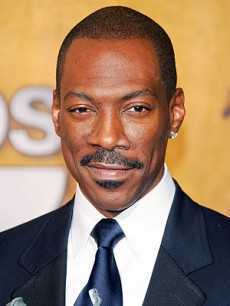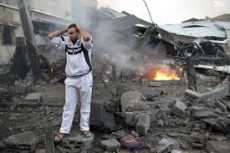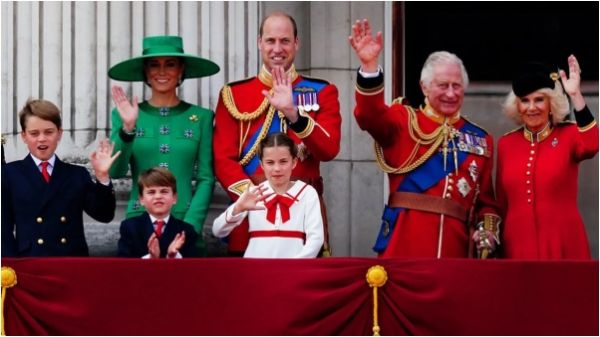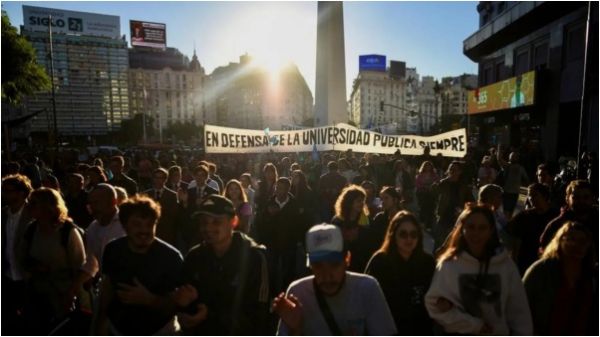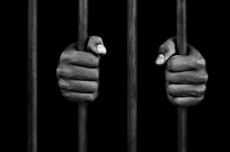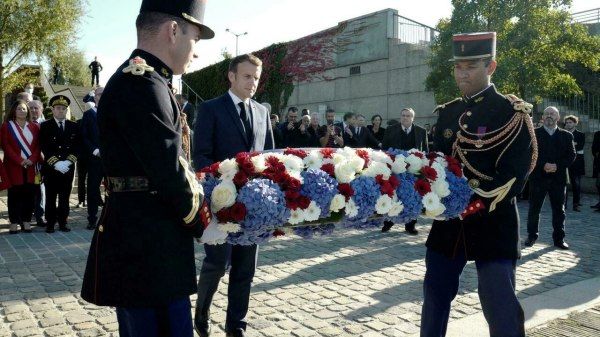
The president “recognised the facts: that the crimes committed that night under [Paris police prefect] Maurice Papon are inexcusable for the Republic," said a statement from the Elysée Palace.
“It’s not enough", lamented Rahim Rezigat, 81, former member of the France federation of the National Liberation Front (FLN).
Macron “is playing with words, for the sake of his electorate, which includes those who are nostalgic for French Algeria", said Rezigat, who attended an event organised in Paris on Saturday by the anti-racism NGO SOS Racisme, bringing together activists and youths from the Ile-de-France region to commemorate that deadly night.
On October 17, 1961, some 30,000 Algerians demonstrated peacefully at the call of the FLN resistance movement in response to a strict 8:30pm curfew imposed on Algerians in Paris and its suburbs.
Ten thousand police and gendarmes were deployed ahead of the demonstration. The repression was bloody, with several demonstrators shot dead, some of whose bodies were thrown into the River Seine. Historians estimate that at least several dozen and up to 200 people were killed, but the official toll is three dead and 11,000 wounded.
‘A state crime’
Critics of Macron’s declaration Saturday say it did not go far enough and that pinning the blame solely on Papon is downplaying the state's in the massacre.
“Believing or expecting others to believe for one second that Maurice Papon could have acted of his own initiative throughout the month of October 1961, and especially on October 17, 1961, and that then interior minister Roger Frey and the entire government headed by Michel Debré were not responsible, is a fairy tale, and a bad one at that,” political scientist Oliver Le Cour Grandmaison, told FRANCE 24 on Sunday.
Knowing that power is exercised vertically in France's Fifth Republic, Le Cour Grandmaison said, “we consider that this was a state crime and therefore, we could have expected Emmanuel Macron’s declaration to reflect that. But there was no recognition, no law, no reparations. There wasn’t even a declaration. Macron didn’t speak,” he said, referring to the fact that the declaration was issued as a statement from the Elysée.
Gilles Manceron, a historian specialising in France’s colonial history agrees.
“This is a state crime, it is not a prefectural crime. It was a state crime that implicated a number of state officials and General De Gaulle, even though he did not direct the events himself and would also express his dissatisfaction with them, reportedly saying they were inadmissible – though secondary,” Manceron told FRANCE 24. “He didn’t direct the violence, and regretted it, but he covered it up with silence. Which contributed to the decades of silence that followed.”
Access to archives restricted
Human rights and anti-racism groups and Algerian associations in France staged a tribute march in Paris on Sunday afternoon. They called on authorities to further recognise the French state's responsibilities in the “tragedies and horrors” related to Algeria's independence war and to further open up archives from that period.
Earlier this year, Macron announced a decision to speed up the declassification of secret documents related to Algeria’s 1954-62 war of independence from France. The new procedure was introduced in August, Macron's office said.
The move was part of a series of steps taken by Macron to address France's brutal history with Algeria, which had been under French rule for 132 years until its independence in 1962.
But Le Cour Grandmaison, who heads an association for the commemoration of the October 17, 1961 events, said the archives were still very difficult to access.
“If you want to access the police archives, you have to ask the police prefecture, who is both judge and party to the events,” he told FRANCE 24. “Access to archives in France, compared to other democratic countries, is extremely restricted.”
Mancheron explained that “theoretically, French law dictates that archives should be communicable after a period of 50 years. But when the 50-year period was about to end concerning the archives of 1961, an interministerial directive was issued, saying a specific green light would be needed in order to open up certain archives. Which resulted in access being limited, even though it was permitted by law.
“Hence the mobilisation of historians and archivists and of a certain number of associations which last July led to the highest French court ruling that the interministerial directive of December 2011 was illegal, illegitimate, that it should not have been allowed, and it was canceled.”
During the commemoration event Saturday night, SOS Racisme put on a pyrotechnics display at Pont Neuf, a bridge crossing the River Seine in the centre of Paris. The fireworks mimicked the bullets fired by the police 60 years ago as the Seine lit up and Algerian irises were thrown symbolically into the water.
On Sunday morning, Paris Mayor Anne Hidalgo attended a tribute ceremony at the Saint-Michel bridge, in the capital's centre, and the Paris police prefect, Didier Lallement, laid a wreath of flowers at the site.
It was the first time a Paris police prefect paid tribute to the victims of October 17, 1961. Though he did not speak at the event, bells tolled and a minute of silence was observed.
Criticised on the right
Macron's political opponents from the right also criticised his declaration – this time for going too far.
“While #Algeria insults us every day, Emmanuel #Macron continues to belittle our country,” far-right presidential candidate Marine Le Pen tweeted on Saturday.
The sentiment was echoed by another far-right presidential hopeful, Nicolas Dupont Aignan, who tweeted, “Algeria spits on France and Emmanuel Macron does penance. The head of state must inspire pride, not shame in being French. Otherwise, how can we be surprised that immigrant populations do not wish to assimilate?”
And centre-right Les Républicains MP Eric Ciotti tweeted, “President Macron’s vicitimised anti-French propaganda is indecent. We’re still waiting for the president to commemorate the July 5, 1962 Oran massacre, when the FLN massacred several hundred pieds noirs and harkis [pro-French Muslims] loyal to France.”
In a message marking the 60th anniversary of the deadly crackdown, Algerian President Abdelmadjid Tebboune called Saturday for an approach free of "colonialist thought" on historical issues between his country and France.
"I reaffirm our strong concern for treating issues of history and memory without complacency or compromising principles, and with a sharp sense of responsibility", free from "the dominance of arrogant colonialist thought", he said.
The message came shortly after Tebboune declared that Algeria would observe a minute's silence each October 17 in memory of the victims.
Relations between Paris and Algiers have been strained amid a diplomatic spat fuelled by a visa row and comments attributed to the Macron describing Algeria as ruled by a "political-military system" that had "totally rewritten" its history.
Algeria has recalled its ambassador from Paris and banned French military planes from its airspace.
Tebboune has demanded France's "total respect".
"We forget that it (Algeria) was once a French colony ... History should not be falsified," he said last week.



